Rachel Held Evans's Blog, page 30
October 30, 2013
13 Things I Learned About Church History From ‘The Story of Christianity, Vol. 2’ by Justo L. Gonzalez
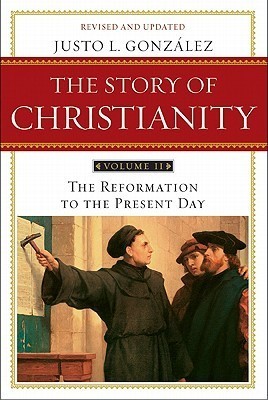
Last Sunday was Reformation Sunday, which I celebrated by being a know-it-all, thanks to Justo L. Gonzalez’s The Story of Christianity, Vol. 2. I am nearly finished reading. Here are a few things I learned:
1. People who say religious dialog is more vitriolic than ever know nothing about church history. See the Martin Luther insult generator for some examples.
2. Luther wasn’t a biblicist. While he insisted on the centrality of Scripture in the Christian life, he believed that final authority rested neither in the church nor in the Bible, but in the gospel of Jesus Christ, who is the Word of God incarnate. The purpose of Scripture, he believed, was to point to Christ. (And he wasn’t a fan of the Epistle of James or the book of Revelation.)
3. Fun story: This dude named John Knox really, really, really hated Catholics. He also really, really, really hated women. So he wrote this book called The First Blast of the Trumpet against the Monstrous Regiment of Women, attacking many of the Catholic women who then reigned in Europe. “His work,” writes Gonzalez, “was poorly timed, for it had scarcely been circulated in England when Mary Tudor died and was succeeded by Elizabeth.” Elizabeth was Protestant and a potential ally of Knox’s. “Although the book was written against her now dead half-sister,” continues Gonzalez, “Elizabeth resented much of what it said, for its arguments based on anti-feminine prejudice could just as easily apply to her. This hindered the natural alliance that should have developed between Elizabeth and John Knox, whose retractions did not suffice to appease the English queen.” LESSON: Don’t expect women to forget your sexist remarks the minute you need their political help. Also, I call dibs on “The Monstrous Regiment of Women” for a band name.
4. More Anabaptists were martyred in the 16th century than Christians as a whole in the three centuries of persecution that preceded Constantine.
5. At a time when Christians were condemning, expelling, and killing one another over doctrinal differences, a guy named Georg Calixtus had the crazy idea that perhaps one could hold to one’s convictions (his were Lutheran) without condemning as heretics those with whom one disagrees. He argued that there was a difference, after all, between heresy and error. This made far too much sense, and Calixtus was largely written off by his contemporaries. But he sounded cool to me so I gave him hipster glasses and a hat:
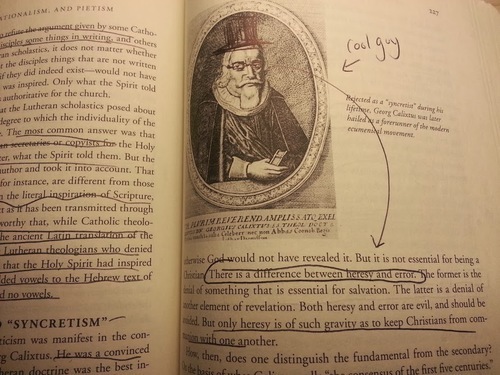
6. Every so often, someone convinces a bunch of people that the end of the world is at hand. They are always wrong.
7. One of these guys, an Anabaptist named Melchior Hoffman, convinced his followers to take over the city of Münster and make it the New Jerusalem, where everyone had visions and practiced polygamy. It’s kind of a skeleton in the Anabaptist closet. But that’s okay. Pretty much every denomination has several thousand such skeletons...many of them literal... so none of us should get too proud. (You Calvinists have Michael Servetus.)
8. King James—like of the King James Bible—was probably gay.
9. Christians have been using the Bible/religion to support violence, colonialism, slavery, ethnic cleansing, misogyny, anti-Semitism and religious intolerance for centuries. We cannot gloss over this reality. (Also, I know there’s this big push among the neo-Reformed crowd right now to make the Puritans seem not-so-bad, but the Puritans did some pretty bad things…to women, to Native Americans, to Quakers, and to religious dissidents. Seems like we should be able to look at the Puritans with a bit more nuance, without glorifying them on the one hand or demonizing them on the other.)
10. John Wesley did NOT want to break from Anglicanism. He never set out to start a new denomination, but felt compelled to reach those whom the church was not reaching and as a result, inevitably generated a separate church, due mostly to practical concerns rather than theological ones. This really bothered him until his dying day. Another interesting fact: Wesley didn’t support the American revolutionary war “because he could not fathom how the rebels could claim they were fighting for freedom while they themselves held slaves” (p. 272).
11.Teresa of Avila is the only woman in the history of the church to have founded monastic orders for both women and men.
12. The center of Christianity is shifting from the global West to the global South and East. Gonzalez does a great job of exploring this shift.
13. I cannot see how anyone can study Christian history and come away from it thinking, “Well good thing I’ve finally got Christianity figured out once and for all!”
Semper Reformanda.



October 29, 2013
Roundtable Discussion: Best Books on Gender & Sexuality
So our sexuality series has been something of a victim of my busy fall travel schedule this year, but we pick things up again today with a roundtable discussion meant to help you explore the topic further on your own time. I asked some of my favorite people—from a wide range of perspectives and areas of interest— about their go-to books on gender and sexuality, and here’s how they responded:

Leigh blogs at Hopeful Leigh about her faith, the church, singleness and relationships, grief and joy and everything in between. (@hopefulleigh)
I wish everyone would read Singled Out: Why Celibacy Must Be Reinvented in Today's Church (Christine A. Colon & Bonnie E. Field) regardless of marital status and sexual history. We often fail to recognize that sexuality is about more than the physical act of sex. We are all sexual beings. The authors shift the discussion from "how do we remain pure until marriage?" to "what does it mean to be a single Christian apart from the possibility of marriage?".
Celibacy is not simply the absence of sex but a spiritual discipline, by which we learn to place God, sex, and Christian community in the right perspective and understand the value of controlling sexual desires. By properly defining celibacy and chastity, the authors present a healthy and freeing framework for the Christian single and married alike. I'm grateful for their solidarity and insights.
Tara Owens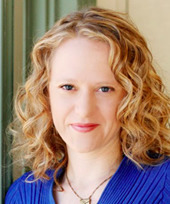
Tara is a spiritual director with Anam Cara Ministries and the senior editor of Conversations Journal. Her book on spirituality and the body will be published by IVP in 2014. (@t_owens)
Sexuality and Holy Longing: Embracing Intimacy in a Broken World by Lisa Graham McMinn: There aren’t a lot of good books out there that address the totality of sexuality—what it means to be a sexual person, married or single and how our sexuality affects our relationships with each other and God. One of the things that I love about McMinn’s book is that it takes on everything from menstruation to masturbation while holding a non-judgmental, open space about how God speaks through every part of our sexuality.
Christianity and Eros by Philip Sherrard: This is a slim book of theologically dense essays by an Orthodox theologian. It’s not for someone looking for a casual read, but I’ve found it to be one of the most enlightening and convincing takes on how marriage becomes sacramental through the expression of erotic love over time. You also don’t have to be Orthodox to appreciate and learn from his scholarship.
Sex God: Exploring the Endless Connections Between Sexuality and Spirituality by Rob Bell: People have strong opinions about Rob Bell, and I get it. His writing style isn’t for everyone, and for some people his theological trajectory isn’t worth following. I get it. That said, don’t let those things keep you from reading Sex God. It’s an accessible look at how our sexuality is a powerful force in our spirituality—every. single. day.
Matthew Vines
This is Matthew's first "visit" to the blog, and I do hope to have him back! Matthew is the founder and president of The Reformation Project, a non-profit organization dedicated to changing church teaching on sexual orientation and gender identity. In March 2012, Matthew delivered a speech at a church in his Kansas hometown, calling for acceptance of gay Christians and their marriage relationships. Since then, the video of the speech has been seen more than 500,000 times on YouTube and has been featured in The New York Times. His book on the topic will be published by Random House. (@vinesmatthew)
1. Bible, Gender, Sexuality by Jim Brownson. Brownson is a New Testament professor at Western Theological Seminary (affiliated with the Reformed Church in America), and he makes the strongest biblical case in favor of same-sex relationships I have yet encountered. He gently but forcefully rebuts the arguments of Robert Gagnon, whose book The Bible and Homosexual Practice is regarded by many non-affirming Christians as the gold standard on this issue. Brownson's conservative approach to Scripture will win over many skeptical readers, and his book should be required reading for anyone who wants to make an informed judgment about the Bible and homosexuality.
2. Roman Homosexuality by Craig Williams. This book does not address Scripture, but it sheds important light on the cultural norms and practices that would have shaped early Christians' understandings of same-sex sexuality. Williams convincingly argues that the modern concept of sexual orientation did not exist for the Romans. Given that the most important passage in Scripture concerning same-sex behavior appears in Romans 1:26-27, this historical study will help readers develop a clearer picture of the world in which Paul wrote his letters.
3. Homoeroticism in the Biblical World by Martti Nissinen. Nissinen's study of ancient Near Eastern attitudes toward same-sex relations offers a necessary backdrop for understanding the Old Testament's references to same-sex behavior. He argues that same-sex relations were condemned primarily because they undermined patriarchal gender roles, meaning that Christians should acknowledge a significant cultural component to biblical passages about same-sex behavior.
Grace Biskie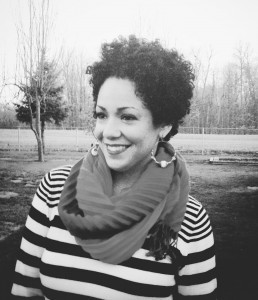
Grace blogs at Gabbing with Grace about faith, race, surviving sexual abuse, depression, justice, hope, and more. (@gracebiskie)
1. The Wounded Heart book & workbook (Dan Allendar) - this one has more of a focus on being an adult survivor of childhood sexual abuse, so it's specific but very helpful if in it's specificity.
2. Breaking Free: Understanding Sexual Addiction & the Healing Power of Jesus by Russell Willingham (again, it's specific about particular sexual addictions but it's good, solid theology & a very good read).
3. Real Sex by Lauren Winner. I'm guessing you all ready know about this because it's so good. She's just incredible. It's such an interesting take on chastity, purity & all that jazz.
Matthew Lee Anderson
Matthew is the author of The End of Our Exploring: A Book about Questioning and the Confidence of Faith and Earthen Vessels: Why Our Bodies Matter to Our Faith. He blogs at Mere Orthodoxy. (@mattleeanderson)
What two books do I find myself returning to and learning from? On the contentious question of what good news the church has for gay Christians, few books are more sober, plodding, or poignant than Oliver O'Donovan's Church in Crisis. He manages somehow to disappoint nearly every camp, yet proceeds with a patience that is rare. Few works I have read have more clearly stated what's at stake in the debate.
The other that I continue to return to is Pope John Paul II's Theology of the Body. Yes, I'm a happy evangelical and so find myself occasionally disagreeing with the author. But those disagreements are always fertile, and I walk away understanding more than I did in advance. It's a big book, yes, but when read slowly it has an astonishing formative effect: it shapes how I see the world without me always realizing how (which is why you should skip the various popularizations of it and just dive in).
Dianna Anderson
Dianna blogs at diannaanderson.net. Her first book, Damaged Goods, examines evangelical purity culture from a Christian feminist lens and is due out in 2015. (@diannaeanderson)
Hmmmm, I don't know if I could choose a favorite...but some that are helping me (as I'm reading my way through) are:
What You Really Really Want: the Smart Girl's Shame-Free Guide to Sex and Safety by Jaclyn Friedman. I believe knowing yourself is the most important part of making sexual decisions, and Friedman offers a rubric/approach that is useful and helpful for beginning that journey, especially if you come from a culture where you've received negative messages about sex.
All About Love, by bell hooks. I'm offering this with a precaution that I've only read a couple chapters, but what I've read, I like. hooks examines and discusses the social mores and conditioning around the concept of love in a way that inspires people to be better within the basic concept of being human.
***
Now it's time for you to join in. What are your favorite books on gender and sexuality…and why? Which have made the biggest impact on you personally?



October 25, 2013
Slow

I think I need to take up gardening.
Because, to be honest, sometimes I get impatient with the Kingdom. I expect it to keep pace with my world, growing through power and money, Facebook shares and book sales, violent acts, violent words, and violent thoughts—seeds tossed on shallow, neglected soil just to get eaten up by birds.
I’m really good at throwing seeds at birds.
But I suspect the stories of Jesus make more sense to folks with a little dirt and flour beneath their fingernails, folks who are patient.
The Kingdom is like yeast.
The Kingdom is like a pearl.
The Kingdom is like wheat growing among tares.
The Kingdom is like a farmer.
The Kingdom is slow.
Kingdom seeds are mustard seeds, planted and tended in good soil. Some of them are just now swelling and splitting underground; others are breaking through the surface with a garish flash of green; others are meandering toward the sun, desperate for light or rain or some sort of trellis; others are growing slow and steady into tall shade tress with limbs like arms wide open to the world, welcoming the birds of the air to nest in their branches.
Truth be told, my little Kingdom plant looks a lot like a weed right now, more fit for bugs than for birds.
But perhaps, if I am patient - if I don't lose hope, if I trust the soil and water it well - the tree will keep growing, and those birds I’ve been throwing seeds at will find a place to rest instead.
The Kingdom is slow.
Perhaps I should stop rushing it.
Perhaps I’m not waiting on it as much as it is waiting on me.



October 24, 2013
The Things That Take Leaders Down
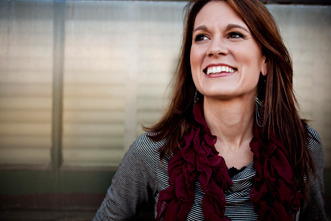
Today I'm delighted to share a guest post from my friend Sarah Cunningham. What I love about Sarah is that she's a big dreamer with ambitions and ideas and goals, but she's also a deliberate dreamer, someone who is mindful about her relationships and her well-being and about how her decisions might affect the most important things in her life. As someone who gets overwhelmed at times by the "industry" of Christian publishing, I look to people like Sarah to remind of what's most important.
Sarah has a new book out that brings her wisdom to those working in ministry or nonprofit organizations. This post provides some really practical ideas on serving well while staying sane. Enjoy!
***
I wish I could claim it is only natural that I would be the one who wrote a book called The Well Balanced World Changer: A Field Guide for Staying Sane While Doing Good.
Due to how famously well balanced I am and all.
Due to how I gracefully leap from one well-balanced pose to the next throughout life.
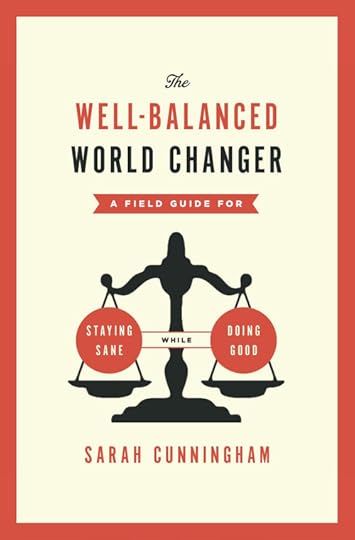
But the people who know me, particularly those who knew me in my save-the-world twenties, would no doubt write Rachel and set the record straight. They would rat me out for spending the better part of three years venting about 2,196 flaws I found in the church and life in general.
At least for me, balance has never been a permanent state—a way of being I arrive at once and for all with finality. Instead it is like a long-term vacation spot that I keep frequenting with hopes that maybe one day I will move there when I grow older.
I find balance. Then life—if I don’t let it grow monotonous, if I keep moving—is bound to produce some new challenge or weight, which inevitably imbalances me, and then gradually I find my way back to even-keeled.
It may not be much to brag about then, but at least it’s honest to say the path to writing The Well Balanced World Changer is growing more balanced as I grow, but it’s not quite well balanced yet.
So out of my observations from living, sometimes balanced and sometimes not, I’d like to offer a few confessions about how life often grows tipsy and some ideas about how we might find our footing again.
Even if we pretend we’re impenetrable, we all pay attention to what other people are saying.
The problem with that, of course, is that if we let ourselves feel good when someone approves of us, it bestows on them the authority to make us feel bad when they disapprove as well. In turn, we feel just awful in the moments when no one claps, when the room falls silent, when others dismiss us. If we want to dethrone our critics then, we have to first give up our own love for basking in the applause.
Even if it seems like we can do it all, we can’t.
Some of us are pathological super heroes who thrive on the stress and drama of taking on enormous burdens or challenges. We assess a gigantic task and decide yes, if we give it everything we’ve got, we can handle it. That may mean we can pull it off if we sideline everything else, if we stay up until 3 a.m. every night, if we eat three meals of crackers while we’re glued to our computer and if we take our laptops to the poolside.
But maybe the best question is not, Can I do it?, but Can I do it healthily? Can I do it and stay sane? Can I do it without my other priorities slipping? Can I do it without neglecting the people I love?
Even the best of us drop some balls when we juggle too much.
My car gets messy, laundry piles up, I skip self-care items like checkups or haircuts. I don’t paint my nails, I screen my calls, emails back up to oblivion. Each one of us has red flags on the path to burnout. Once we name these caution signs along the way, we are more likely to notice them falling. And once we notice them falling, we are more likely to do something to stop the domino effect to meltdown. So pause and identify them!
We take on too much responsibility for other people’s actions.
We want to bear each other’s burdens, right? But here’s a little known secret. You can claim the right to manage someone else’s burden differently than they do. You can be wiser or smarter about how you hold it. You don’t have to let drama or emotions rule your world just because they do.
As people of faith, we’ve been called to rejoice. What kind of God would then insist you not only live all of your own bad days but that you also live bad days every time someone else has one? Can you imagine? Every day would be a bad day if knew enough people! You can care and love, but you are not responsible for other people’s emotions. You cannot make them happy. All you can control is what you let your own mind dwell on. So be careful, friends, what we dwell on, we become!
We worry we’re missing that one thing God has for us.
Are you anxious because you can’t figure out “God’s will” on where to live, whether to quit your job, who to marry, what job to take? Don’t be. Anxiety is not God’s style. God’s will is not a maze and he is not a sadistic video game programmer who dead ends your life if you take a right where he wanted you to take a left. If you take a job in Georgia instead of Ohio, he doesn’t lose your file folder. His GPS doesn’t go down. If you marry Angela instead of Erika? He doesn’t stop inviting you to pool parties. He is not a catty middle-school girl. As long as you are seeking after him, he sees potential in every place you put your foot.
Even when we’re crystal clear in the beginning, our values drift.
What do you value in life? Don’t answer that. Don’t say it aloud or write it down. Just look at these three things: 1. What you’re putting your time into 2. What you’re putting your money into and 2. What you’re putting your energy into. That’s what you value.
Anytime life gets out of whack, it’s a pretty good bet we’re putting one of those three things in the wrong place.
We are aiming for long-term significance, but we get stuck in short-term worries.
You’re neck deep in some sort of drama over a work obstacle, a dysfunctional member of your community, or some other wrench in your organization. It seems life-shattering now, but it can be helpful to ask, “In ten, twenty, fifty years, how much will it matter?” If the value at stake would be noble and right in every era, no matter how old (or dead) you are, then fight for it. But reality is, most things we worry about won’t matter at all in fifty years. And if that’s the case, that’s probably about as much as they matter now too.
We lose our identity in our work.
You work in a non-profit or sink your life into a faith community or charitable cause. Good for you. That means your work is important and it has ramifications for many people outside of you. So when it produces endless lists of things you’d like to do, unending lines of needs, you are willing to sink everything you have into hitting those benchmarks, raising funds and awareness, getting that good work humming! It’s hard to keep momentum, but it is worth the strain. Our family and friends understand. Backed up housework or well balanced meals and exercise aren’t as important as spirituality, as orphans, as health care.
That is...until we’re so weary we don’t want to do it any longer and we crash. Then who helps these people? So stop already! Reverse this crazy idea that if you run yourself dry, you have given the most. You give the world the most if you’re alive and healthy enough to serve tomorrow.
***
Sarah is an author, idea junkie and Chief Servant to a four year old Emperor and his one year old Chief of Staff. She does freelance work organizing conferences and supporting publishers while drinking chai in Michigan. Sarah's new book containing other similar wisdom she's collected from veterans of the faith and humanitarian arenas is now out. The Well Balanced World Changer: A Field Guide To Staying Sane While Doing Good is available on Amazon, Barnes and Noble, and wherever books are sold. You can also find great shareable content at her book's Pinterest page. And you can contribute your own life lessons to an online collection of wisdom using the hashtag #worldchangerbook.



October 21, 2013
10 Marriage Reality Checks (from 10 Years of Marriage)
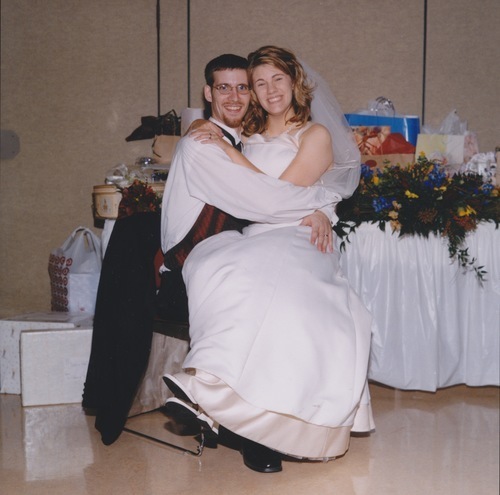
We got married before Pinterest. That's why there are no mason jars or paper cranes.
This week Dan and I celebrate our 10th wedding anniversary!
Of the many good things in my life, I must say my happy marriage is probably the best. But like every couple, we've had to learn as we go. So here are a 10 myths and 10 reality checks we've encountered along the way:
***
Myth #1: The best way to prepare for marriage, and to thrive in it, is to learn the differences between men and women so you will know what men/women want.
Reality Check: The best way to prepare for marriage, and to thrive in it, is to learn about your partner so you know what your partner wants.
You don’t marry a gender; you marry a person. And yet the majority of Christian marriage books dole out advice based on gender stereotypes: “men need adventure,” “women need security,” “men like quiet time,” “women process verbally,” “men crave respect and control,” “women crave love and emotional intimacy,” “men are like microwaves,” “women are like ovens.” But even before we got married, Dan and I realized that just as often as we fit these generalities, we don’t. Dan knows I’d prefer tickets to a football game over a nice piece of jewelry and that too much security and not enough adventure leaves me feeling bored. I know that Dan is better at nurturing friendships than I am and thrives creatively when he has the chance to collaborate with other people.
So for all of this talk of men being “wired” one way and women being “wired” another, we have found, as Micah Murray puts it, that “wires are for robots.” We are human beings, and we relate to one another better when we stop expecting the other person to behave in a prescribed, programmed way but instead talk openly with one another about our actual desires, preferences, hopes, and expectations.
This is why I would sooner recommend The 5 Love Languages to prospective couples than one of the myriad of Christian books that attempt to prepare people for marriage by basing advice on gender stereotypes. Or better yet, compare your results from the Myers-Briggs Type Indicator, the Taylor-Johnson Temperament Analysis, or the Enneagram. Or best of all, simply pay attention to one another to observe what makes the other person laugh, rest, rejuvenate, connect, grow, and thrive and try to communicate with one another about what makes each of you laugh, rest, rejuvenate, connect, grow and thrive. You don’t marry a gender; you marry a person. And you get to spend the rest of your marriage figuring out what makes your partner tick.
Myth#2: Never go to bed angry.
Reality Check: 3 a.m. is not the best time to sort out your feelings.
I suspect this oft-repeated piece of advice is meant to encourage couples not to repress or hang on to their anger, but to sort out their differences in a timely manner before the years of inattention turn them into deeper wounds than they need to be…in which case I totally agree.
But, in my experience, sometimes the best way to keep communication healthy and open is to go to bed angry and then talk about it the next morning when you’ve had enough sleep to know that leaving the milk out in the car probably wasn’t a veiled act of aggression meant to symbolize every problem in the relationship, but rather just the sort of mistake anyone would make while distracted by a fascinating story on NPR.
Sometimes lack of sleep is actually the cause of friction, so taking that out of the equation and waiting to talk when everyone’s a bit more rested might actually be a better strategy for nipping the conflict in the bud.
Myth #3: If you wait until marriage to have sex, your first time will be FLAWLESS and AWESOME and there will be FIREWORKS and ANGELS SINGING OVER YOUR FAITHFULNESS!
Reality Check: The bad news is this is total bull; the good new is it gets much, much better.
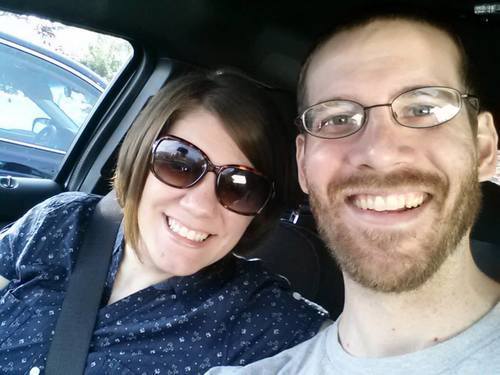
Myth #4: Women must learn to be indirect about their opinions and desires so as not to upset a man’s sense of “leadership” in the home.
Reality Check: It is healthier to communicate honestly and openly with one another to avoid manipulation and repression.
I can’t tell you how many wedding showers I’ve attended in which women joke with the bride about how to get her way by making her husband think something was his idea when it was really hers. Ironically, I hear this most often from folks who promote hierarchal gender roles in the home. Since women are seen as their husband’s subordinates, they have to think of creative ways to share their ideas and desires rather than just stating them directly, for fear of taking too much initiative in the relationship.
But let me tell you, Dan would much rather I take the initiative and communicate to him directly about my thoughts, ideas, and opinions because 1) he’s from Jersey and that’s how people from Jersey talk to each other, 2) it’s way more efficient, saving time and emotional energy, and 3) I’ve got some damn good ideas and Dan’s not threatened by that. Dan and I are a team and we function so much better when we make decisions together, without a pecking order and without subtle, manipulative games.
Myth #5: All you need are shared values and shared faith to get along.
Reality Check: This may be true…but I’m pretty convinced that a shared sense of humor is just as important.

Halloween 2009: Truck Driver & Road Kill
Myth #6: Women need men to be their spiritual leaders.
Reality Check: You’re going to need one another on the journey of faith.
The teaching that men are to be the “spiritual leaders” of their homes is found nowhere in Scripture, and yet I—along with far too many young evangelical women—spent hours upon hours fretting over this in college, worrying I’d never find a guy who was more knowledgeable about the Bible than I, who was always more emotionally connected to God than I, who was better at leading in the church than I, and who consistently exhibited more faithfulness and wisdom than I. (In fact, under this paradigm, I came to see many of my gifts as liabilities, impediments to settling down with a good “spiritual leader”!)
Well guess what. I never found such a person. I never found a spiritual “leader.” Instead, I found a spiritual companion to travel with me on the journey of faith, for better or worse, in good times and bad, in times of spiritual wealth and in times of spiritual poverty. Dan isn’t expected to always be the strong one while I am always the weak one. Instead, we cheer each other on, help each other up, and challenge each other to do better. Sometimes we walk side by side, moving along at a quick pace. Sometimes we help each other over boulders and fallen trees. Sometimes I’m leading the way; sometimes Dan is. Sometimes I carry him and sometimes he carries me. The journey of faith is far too treacherous and exciting and beautiful to spend it looking at the back of another person’s head. Jesus leads us down the path, and we tackle it together, one step at a time.
The Bible never teaches that one partner must be more spiritually mature than the other. But it does teach that “two are better than one, because they have a good return on their labor: if either of them falls down, one can help the other up.” (Ecclesiastes 4:9-10). When Dan doesn’t feel pressure to always be the leader, he can relax and lean on me when he needs to. And when I don’t feel the pressure to always be the follower, I can relax and be myself and let my gifts flourish. We’re in this together, side by side.
(I'm being told some people think Ephesians 5 teaches that men are to be spiritual leaders. I deal with that a bit here.)
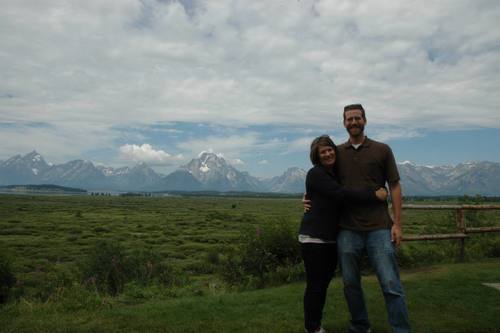
We celebrated our 10th a little early with a summer trip to Glacier National Park, Yellowstone National Park, and the Grand Tetons.
Myth #7: “We don’t need a marriage counselor/financial planner/psychological evaluation/sex therapist/ recovery group/doctor, we have a pastor!”
Reality Check: You may very well need a marriage counselor/financial planner/psychological evaluation/sex therapist/recovery group/doctor.
Unfortunately, too many churches these days think of their pastors as either gurus or czars, and some even discourage church members from seeking guidance or help for their marriages outside the church. This is profoundly unhealthy, as many pastors are not qualified to be financial planners or to diagnose mental illness or to counsel couples through their conflicts in an unbiased and educated way. Furthermore, such models place far too much pressure on pastors and create unrealistic expectations around them. If you are part of a church that discourages outside counseling, get out; it’s not healthy. A good pastor will be eager and able to recommend you to an expert when he or she senses an issue may be out of his/her depth.
Myth #8: One spouse is called to make the money and the other spouse is called to make dinner. One spouse is called to make the decisions and the other spouse is called to make the home.
Reality Check: You are called to make a life together.
I can see where sticking to agreed-upon roles can be helpful in some cases, but I think it’s unwise to base these roles on gender or ideology (as opposed to practicality), and I think it’s destructive to impose them legalistically, without regard to changing life circumstances. One of the first lessons you learn in a marriage is that you can plan and dream all you want, but you have to live in reality. So if your notion of “roles” can’t survive a layoff or a pregnancy or an illness or one partner’s success or another partner’s disappointment, you’re asking for trouble.
The point is to make a life together, based on your unique circumstances and gifts, not to force yourselves into prescribed roles regardless of how they fit. Dan and I tried the gender-based roles thing at first, and while some of those roles stuck, others didn’t. These days, we don’t assign the task of breadwinning to one partner and the task of homemaking to the other; we work as a team, shifting responsibilities and tasks to accomplish a common shared goal: to be self-employed while making enough money to the pay for internet. (Okay, so we've got other goals too, but that’s the main one right now!)
Our life isn’t divided into two spheres. Our goals, joys, disappointments, successes, failings, financial earnings, investments, ideas, dreams, and plans are shared. Always.
(Note: I do think that when roles are more fluid, there may be more occasions for conflict as it’s not always clear who is responsible for what in the home. This has been the source of some disagreement within the Evans household, and I suspect many others. A big turning point in my own attitude and posture in this regard happened when I heard a report…on NPR, of course!...about a study that revealed that in a workplace setting, when two people have been assigned a task, both consistently report believing they did more work than the other person to accomplish it. The conclusion from the study was that even when responsibilities are evenly shared, we humans have a habit of believing we have done more and our partners have done less. So when I find myself resenting Dan for presumably not doing as much as I’m doing, I remind myself of all the things he HAS been doing—like keeping track of our crazy TAXES for example!—while I wasn’t paying attention. It’s a little thing, but it’s really helped.)
Myth #9: If you go into marriage assuming divorce isn’t an option, then it will never happen.
Reality Check: Divorce happens and you don’t avoid it by pretending it doesn’t.
This is something that Dan really impressed upon me as we began our marriage. Having come from a (wonderful & loving) home where his parents got divorced, Dan knows from experience that simply being “against” divorce doesn’t prevent it from happening. So from the beginning, Dan has been a big advocate for not taking our marriage for granted, but rather working on it every day.
(This is not to say that all marriage fail because of lack of hard work. They fail for a myriad of reasons and I’m not interested in judging or condemning anyone who has experienced that painful process.)
Myth #10: A Christian home should be centered around a certain household model.
Reality Check: A Christian home should be centered around the person of Jesus Christ.
Growing up in the church, I always heard that a Christian home would only flourish if there was a clear patriarchal pecking order in which the husband leads the wife and the wife submits to her husband. This was supposedly based on the teachings of Scripture, and yet I saw plenty of marriages based on that model fall apart!
Obviously, I’m a big advocate for mutual submission in marriage, as that is what I believe those biblical passages ultimately teach and this is what works best in our marriage, but more important than adopting a single household model—either patriarchal or egalitarian—is adopting the posture of Jesus Christ, who emptied himself of power and took the role of servant. If I’m honest, I’ve seen this sort of humility and service reflected in egalitarian marriages, and I’ve seen this sort of humility and service reflected in more complementarian/patriarchal marriages. So I don’t think it’s as much about finding the perfect model in terms of a structure as it is about finding the perfect model in terms of the person of Jesus. If I’ve learned anything in the past 10 years of marriage it’s that you can’t go wrong imitating Jesus’ humility, forgiveness, patience, compassion, and love.
Myth #10.5: You should follow all of my marriage advice to the letter because I’ve totally got this marriage thing figured out.
Reality Check: I don’t. Take all of this with a grain of salt and sense of humor, keeping in mind that I wrote most of it this afternoon while still wearing my pajamas.
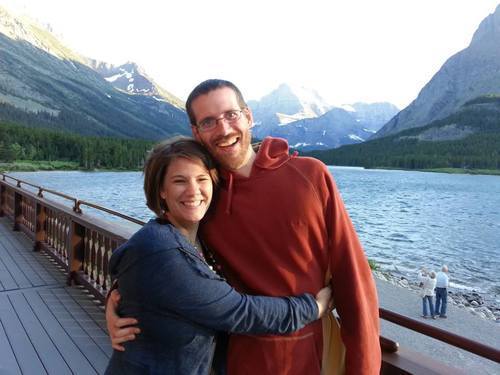
I like that in this picture you can see that older couple down by the lake enjoying each other. I hope we are as happy in 40 years!
***
So, what are some marriage myths and reality checks you’ve learned long the way?
I’d love to hear from singles too about more general relationship myths and reality checks.



October 20, 2013
Sunday Superlatives 10/20/13
Best Video:
Lily Myers with “Shrinking Woman”
Best Interview:
Sharon Hodde Miller interviews Lynn Cohick for Her.Meneutics in “The Double-Edged Sword of Being a Female Bible Scholar”
“I wonder if people think, "Lynn has been asked because she's a woman, so I'm going to presume that her work is not that good, that she wasn't given this based on her merit or her argument, but just because she's a woman. There are still tremendous challenges for women in evangelical scholarship, and I'm just not sure how to go forward because of the tokenism mindset. I want to encourage female scholars, but I would want a young, male New Testament scholar to look up to me as much as a female New Testament scholar would. I want to move beyond thinking that I should just mentor women. I should also mentor men, and I think that would be the next frontier.”
Best Synchroblog:
The “When We Were on Fire” Synchroblog, via Addie Zierman, whose excellent book by that title released last week
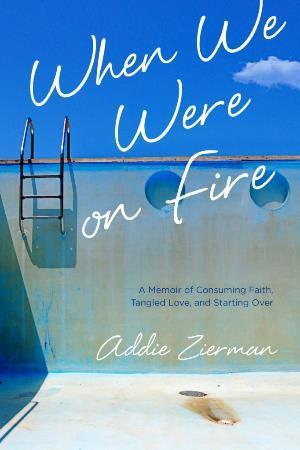
Best Writing:
Tina Francis at Deeper Story with “Jerry Springer Scones: A Love Story”
“No, fighting for peace is rarely a glamorous affair. The icky work of peacemaking is about leaning into discomfort and swallowing your pride. It’s the scary undertaking of feeling ALL the feelings–and choosing love anyway. It’s sticking around for tough conversations when you’d rather stab a pillow. It’s parking your butt in the vinyl kitchen chair and meeting in the middle instead of hiding out at Starbucks. It’s baking scones for your love when you’re feeling vulnerable and exposed. It’s choosing to believe that your husband isn’t going to break your heart, even though your ex-boyfriend butchered it beyond recognition. It’s refusing to say scarring words–the ones you can’t take back and that he’ll never forget; words that will break both your Humpty Dumpty hearts forever. Peacemaking is “Grab the Clorox and clean the toilet bowl” kind of work. It’s also beautiful, sacred, holy work."
Best Response:
David Hayward with “John MacArthur Sends 500,000,000 Charismatics to Hell”
“Jesus said that the Spirit comes and goes as it wills, like the wind, beyond our control and understanding and even sometimes beyond our observation. Is it possible that this movement that MacArthur can’t control, can’t understand, and can’t even explain is the very wind of the Spirit he desires? Is it possible that this movement that he and his fellow theocrats can’t harness is the Spirit that won’t and can’t be contained? Is it possible that the maverick Spirit is acting in a very unreformed manner, thanks be to God?"
Best Profile:
LA Times honors Sister Antonia Brenner
“Small of stature, with blue eyes peeking out from under her traditional black–and-white habit, Brenner cut a strikingly serene presence in the overcrowded prison of 8,000. She lived as any other inmate, sleeping in a 10-by-10-foot cell, eating the same food and lining up for morning roll call. She would walk freely among thieves and drug traffickers and murderers, smiling, touching cheeks and offering prayers. Many were violent men with desperate needs. She kept extra toilet paper in her cell, arranged for medical treatment, attended funerals.”
Best Story:
Brant Hansen at CNN with “Mr. Spock Goes to Church: How One Christian Copes with Asperger’s Syndrome”
“I still feel alienated from many parts of Christian culture, but Jesus himself finally reached me. And man, did I feel that. To people who are beaten down or befuddled by religious rules, Jesus offers something that no one else does: rest. ‘Come to me, all you who are weary and burdened, and I will give you rest,’ he says. And he sums up the entirety of complex and confusing religious laws with this: “Love God, and love your neighbor.” Beautiful. Even children can understand that.”
[Reminds me of Erin Thomas' great guest post: "Embracing Faith as an Aspie"]
Best Insight:
N.T. Wright on the Doctrine of Election
“At the heart of one of Paul’s strangest and most challenging chapters we find exactly this theme: that the creator God, having entered into a covenant with Abraham’s family that he would bless the world through that family, has been faithful to his promise, even though it has been in the upside-down and inside-out way now unveiled in the Messiah.”
Best Idea:
Marque Jensen with “In place of Columbus Day? Remembrance and Repentance”
“What if Columbus Day was replaced with a day that encouraged us to tell the truth about the past, and then to go do something to make the future better?"
Best Links Roundup:
Erin Wilson at She Loves with “Good News for Girls”
Best Satire:
Heather Goodman with "The Insidious Attack on the Word of God by a Meteorologist"
"Now, in this we can clearly see that God creates snow and hail, and piles them up in storehouses, somewhere in the sky. When there is trouble, He simply empties out the storehouses and the snow and hail come tumbling down to Earth. But meteorologists do not acknowledge that God stores up snow in some hidden place. Instead, they speak as though snow and hail are some sort of natural phenomenon, and that the snow and hail are formed SPONTANEOUSLY, during a storm – not stored up for the day of trouble, as the Bible clearly says."
Best Series:
Geoff Holsclaw with “The Scandal of the Evangelical Memory”
Best Question:
Pete Enns and David G. Benner with Should We Fear God?
"What kind of God is actually at work in your life–not the one you tell others you believe in but the one deep down that actually drives your spiritual engine? If your God is a “dangerous” God in Benner’s sense of the word, what difference would it make in your life to allow that false God to die? What if you are created in God’s image, God actually loves you, and you actually believed that? How would things be different for you?"
Most Sobering:
A List of Children Killed by Drone Strikes in Pakistan and Yamen
Most Relatable:
Kristen Rosser with “Saved By Being Right: Christianity and Dogmatism”
“Dogmatism in Christianity, I think, comes primarily from fear. If we believe we are saved by faith, and we define faith primarily in terms of having the right set of beliefs, then anything that challenges those beliefs must be resisted as evil. Our thinking becomes defensive rather than inquiring, didactic rather than exploratory, closed rather than open. We see our role as the instructors and correctors of others, rather than as listeners and learners.”
Most Fascinating:
Melissa Steffan at Christianity Today with “Sarah Young Still Hears Jesus Calling”
Most Practical:
Carol Howard Merritt with “How to Avoid Tokenism”
“There are always qualified women and people of color. We're the majority of the population.”
Most Quotable:
Pope Francis on ideology
"In ideologies there is not Jesus: in his tenderness, his love, his meekness. And ideologies are rigid, always. Of every sign: rigid. And when a Christian becomes a disciple of the ideology, he has lost the faith: he is no longer a disciple of Jesus, he is a disciple of this attitude of thought…"
Most Likely To Capture Your Entire Life in a Cartoon:
Tastefully Offensive with "A Field Guide to Procrastinators"
[I am totally a combination of the "snacker" + the "internet researcher." And it gets so. much. worse. when I'm writing a book.]
Boldest:
“An Open Letter from the Asian American Community to the Evangelical Church”
Wisest:
Tim Peck at the Junia Project with “5 Ways to Avoid Undermining Your Theology of Gender”
“At an unconscious level I viewed assertiveness, confidence, and competition as acceptable traits in men; however, my ingrained impulse was to see these same traits as negative in women. Even after embracing egalitarian theology, I still found that my knee-jerk response was to assume that women displaying these traits were stirring up conflict or trying to cause trouble. In my previous ministry experiences, opinionated and assertive women were sometimes labeled by male leaders as “troublemakers” or “busybodies”. Once labeled, men had the social justification to discount anything these women said, in effect silencing their voices. None of these responses were evoked when I encountered men displaying these same traits. Recognizing that these deeply ingrained assumptions were largely the result of my years as a complementarian, I began to challenge them, and I was able to begin listening to the voices of the women around me and value their leadership.”
Craziest (and I can say this because I’m a Bama fan):
Bama Fan Phyllis goes nuts on Danny Kanell
Coolest:
Bill Moyers features Wendell Berry
“There are no sacred and unsacred places; there are only sacred and desecrated places.”
Truest:
Glennon Melton with “I’ve Got Spirit and So Do You”
“Are we talking about the same God? The one who chose to enter the world in the form of a Middle Eastern, poor, helpless infant when the world was expecting a KING? The God who showed up in the form of a race so oppressed that no one believed he could possibly be the savior because, “nothing good comes out of Nazareth?” The God I’m talking about LIVES to shatter our ideas about Less Than. The God I’m talking about makes himself less than in order to prove that our ideas about what less than means are bunk. Because our less than is NOT God’s less than. The first are the last and the last are the first.”On the Blog…
Most Popular Post:
“Will The Real Complementarian Please Stand Up?”
Most Popular Comment:
In response to the above post, Richard Beck wrote:
“Grade for your hermeneutical analysis of complementarianism in my class on biblical manhood and womanhood: A+. Actually, Rachel, you could teach that class. Don't let any academic type convince you otherwise.”
[Which, coming from someone I admire as much as Richard, meant the world to me.]
Don't Forget...For a LIMITED TIME both A Year of Biblical Womanhood and Evolving in Monkey Town are just $2.99 on Kindle and Nook!
***
So, what caught your eye online this week? What’s happening on your blog?



October 15, 2013
Will the real complementarian please stand up?
Note: It should be taken for granted that I count my complementarian friends as dear brothers and sisters in Christ and would break the bread of communion with any fellow Christian in a heartbeat. My disagreements here are over the interpretation and application of certain biblical texts that have been discussed and debated for many years, texts that should never be used to jeopardize that most important common bond. It's nice to know that in the Family of God we can have unity without uniformity and that even in our most passionate disagreements we can take a moment to look around at all the mismatched members of Christ's Church and chuckle at the miracle of it.
***
If you’ve read A Year of Biblical Womanhood, you will remember that in addition to following all of the Bible’s instructions as literally as possible for a year (sometimes taking them to their most literal, hyperbolic extreme!), a big part of the project involved exploring how a variety of people interpret and apply the concept of “biblical womanhood.”
For example, throughout the year, I corresponded regularly with an Orthodox Jewish woman from Israel who shared with me her perspective on what it means to live “biblically,” particularly as someone who continues to observe Old Testament law. I also interviewed Amish women, a polygamist family, the daughter of a Quiverfull family, and a woman who is a pastor. I attended a “biblical womanhood’ conference, read from cover to cover John Piper and Wayne Grudem’s book, Recovering Biblical Manhood and Womanhood, investigated the Vision Forum and other modern patriarchy movements, read commentaries from Jewish, Catholic, feminist, conservative and liberal sources, and managed to get through Created to Be His Helpemeet by Debi Pearl without destroying it after multiple dramatic tosses across the living room. I quote everyone from Elizabeth Elliot to John Piper to Phyllis Trible to Carolyn Custis James to Dorothy Sayers to Teresa of Avila.
All of these people have different perspectives on life and faith and the Bible, but what they all have in common is a commitment to some idea of “biblical womanhood.” (It should be noted here that I connected with the polygamist family through an organization called “Biblical Families”!) My goal was to listen, learn, explore, and show that “biblical womanhood” might not be as straightforward as we’d like to think, that there does not exist in the Bible a single definition, or list of rules, for something as complex as womanhood.
Now, some in the evangelical complementarian movement—a broad group of evangelicals who often employ the terms “biblical manhood” and “biblical womanhood” in their literature—have said that I failed to represent what true complementarians really believe about “biblical womanhood.” One recently wrote that I took “cheap shots” at the movement and designed my entire project around taking it down.
This is a common enough criticism that I thought I’d address it specifically here.
The problem with accurately portraying what complmentarians believe about “biblical womanhood” is that complementarians do not agree on what they believe about “biblical womanhood.”
This is why I never use the word “complementarian” in the book. It appears only once, and in the context of another person’s quote. I did this on purpose because 1) complementarianism is not a word, 2) I recognize that the movement is too diverse to summarize, and 3) I suspect a more general audience will be unfamiliar with the term anyway.
Instead, I identify and cite what specific people (some of whom identify as complementarian) say about “biblical womanhood.”
In the introduction, for example, I quote from the Council on Biblical Manhood and Womanhood’s pivotal Danver’s Statement on Biblical Manhood and Womanhood to try and capture the ethos of the movement. On page 22, I quote Dorothy Patterson’s statement in Recovering Biblical Manhood and Womanhood that “keeping the home is God’s assignment to the wife—even down to changing the sheets, doing the laundry, and scrubbing the floors.” On page 100, I quote Mark Driscoll as saying that “a wife who lets herself go and is not sexually available to her husband….is not responsible for her husband’s sin, but she may not be helping either.” On page 178, I quote Walter Chantry who said, “Woman’s hope, the church’s hope, the world’s hope is joined to childbearing…Women, here is a lifelong calling! It’s the highest any woman can enter,” and Dorothy Patterson again who said , “We need mothers who are not only family-oriented, but family-obsessed.” On page 203-204 I examine John Piper’s views on women’s submission from Recovering Biblical Manhood and Womanhood, and on pages 207-214, I examine Debi Pearl’s. (Note: I never identify Debi Pearl as a complementarian.) On page 254, I quote again from Recovering Biblical Manhood and Womanhood to share what John Piper and Wayne Grudem say there about women teaching and leading in the church.
If most of these people and organizations identify as complementarian, and if I represent their views by quoting directly from their books or sermons, and their fellow complementarians disagree with those views….that seems like something complementarians need to discuss amongst themselves rather than with me.
It’s ironic that some complementarains have criticized A Year of Biblical Womanhood for employing an inconsistent hermeneutic without seeming to realize that this was exactly what I intended to do with the project. My goal was to shine a light on this notion that the Bible offers a single perspicuous blueprint for womanhood that renders femininity down to a list of rules and acceptable roles. And all this disagreement within complementarian ranks only serves to prove my point.
Owen Strachan is the president of the Council on Biblical Manhood and Womanhood. He believes biblical manhood and womanhood requires sticking to traditional gender roles in the home, and has said that stay-at-home fathers and men who take on domestic duties are “man fails.” Strachan identifies as complementarian. Is this what all complementarians believe? Is this the complementarian view of “biblical manhood and womanhood”?
Similarly, Pastor Mark Driscoll has called stay-at-home fathers “worse than unbelievers” and has recently released a book claiming that men who fail to be the exclusive providers for their families are a disgrace. Driscoll identifies as a complementarian. Is this what complementarians believe? Is this the complementarian view of “biblical manhood and womanhood”?
According to Wayne Grudem, the Bible teaches that a woman can be a choir director, but not preside over a baptism or communion service. She can write about book about theology that is read at Christian colleges and seminaries, but she cannot teach theology at Christian colleges or seminaries herself. She can teach Sunday school to children, but she cannot lead a Bible study with adults. Grudem identifies as a complementarian. Is this what complementarians believe? Is this the complementarian view of “biblical manhood and womanhood”?
Some complementarians believe it is biblical for women to wear head coverings. Others do not. Some complementarians believe it is unbiblical for mothers to work outside of the home. Others allow it. Some complementarians believe it is unbiblical for a woman to even read Scripture aloud in church. Others disagree. . Others are uncomfortable with the term.
So my question for complementarians is this: What is biblical womanhood and who gets to define it?.
My point here is not to discredit a movement for having a diversity of perspectives within it. (I’m a feminist, for heaven’s sake; I get it!) My point is that, despite insistent claims that they simply follow the “clear teachings of the Bible,” complementarians themselves are not in total agreement on what those teachings are. And despite all these references to a patently obvious and consistent hermeneutic regarding biblical manhood and womanhood, complementarians have failed to produce it. This should call into question the premise that Bible presents us with a single, straightforward blueprint for womanhood and that women who deviate from this blueprint are outside the will of God.
One thing that frustrates me about complementarianism, as it is often expressed, is that it teaches men and women that God has specific expectations regarding gender roles but then fails to consistently or clearly explain exactly what those expectations are. My hope is that readers will come to the end of the book reminded the Bible—this ancient, diverse, powerful, God-breathed text—is far too complex to be reduced to an adjective, and that womanhood was never meant to be reduced to a list of rules and roles.
But even more frustrating has been a general refusal among complementarian leaders to engage in conversation about what the Bible actually says. For the past three years, on the blog and in the book, I’ve been asking questions about common complementarian positions on biblical womanhood. For example:
If the Hebrew word ezer is used most often in Scripture to refer to God as a strong helper, why is it said to mean a subordinate when used in Genesis 2 to describe Eve? If man’s rule over woman is introduced in the context of a curse, why would Christians still enforce patriarchy when Christ’s death and resurrection have inaugurated a new creation in which the hierarchal barriers between Jew and Greek, slave and free, male and female are broken down and redeemed? Is Proverbs 31 really meant to be interpreted prescriptively, or does its poetic format suggest it should be interpreted as a celebration of women rather than a to-do list for them? If both Ruth and the Proverbs 31 woman are referred to as “women of valor,” and Ruth clearly worked “outside of the home,” why is Proverbs 31 invoked to forbid women from working outside of the home? If it is “unbiblical” for women to teach or assuming leadership over men why are women like Deborah, Huldah, Miriam, Priscilla, Phoebe, and Junia praised in Scripture for doing just that? Why is “wives submit to your husbands” taken more seriously than “submit one to another.” And if every biblical instance of these instructions for husbands and wives is either preceded or followed by instructions for slaves to obey their masters, (verses that have historically been used to support slavery), might it be prudent to consider the spirit of these instructions in their Greco-Roman context rather than literally applying the letter? (I asked several complementarians to engage in our "One To Another" series and none agreed.) Why are Paul’s instructions regarding Corinthian women wearing head coverings dismissed as cultural and specific to a unique audience, while his instructions regarding Ephesian women teaching the Ephesian church considered universally and timelessly prescriptive? How can 1 Timothy 5 be used to characterize stay-at-home dads as “failures” when the context of those instructions is care for widows? Is a single-income household with a father who goes to work and a mother who stays home really the only way to honor God? Is this really a “biblical” concept or does it impose modern Western cultural assumptions onto the text? Can Christians support such teachings when such a lifestyle is out-of-reach for many of the world’s poor, to whom Jesus first brought the gospel? And what about singles and non-parents? How does the teaching that women are to be subordinate to their husbands in sex square with 1 Corinthians 7, which says the opposite?The response by complementarians to these questions as posed on the blog has been mostly silence, even when I’ve specifically asked for engagement.
And the response by complementarians to these questions as posed in A Year of Biblical Womanhood, with a few exceptions, as essentially been: “Look at this silly woman who thinks you have to make a sign and literally praise your husband at the city gate! She doesn’t understand basic hermeneutics. What an idiot!”
I realize I am not entitled to serious engagement. I’m not a biblical scholar or member of the clergy…just a writer with a love for the Bible and an insatiable interest in how it is read and interpreted. There indeed may be some hubris at work here. Still, though the book has been generally well-received, it’s been disheartening to see this particular group of evangelicals gloss over my questions, and those of many of my readers, in favor of casting the more hyperbolic elements of the project as representative of the whole.
It's frustrating because, for evangelical women in particular, this dismissal of good questions is an all-too-common experience.
For folks who claim to have the corner of the market on “biblical womanhood,” complementarians have been surprisingly unwilling to engage in conversation with me on what the Bible actually says. Instead, I’ve been dismissed as a silly girl out to “confuse” other silly women with a silly blog and book.
Owen Strachan is right. I’d probably flunk his course on biblical manhood and womanhood. But it wouldn’t be because I’m too stupid to understand hermeneutical principles. It would be because I ask far too many questions about them.
***
So what do you think? Is it worth even engaging anymore or should I give up?



October 14, 2013
An Open Letter from the Asian American Community to the Evangelical Church
While I am not generally a fan of open letters, I realize there are circumstances in which the format can be useful and necessary, and this is certainly the case with this open letter from Asian Americans to the Evangelical Church. I wanted to share it here because I know and respect many of the people who signed the letter and trust they did so with conviction, wisdom, and prayer, and also because many of us in this online community are evangelicals and can learn from what our brothers and sisters have to say here.
An excerpt:
We highly value the concept of family, and it deeply distresses us when our non-Asian brothers and sisters do not seem to recognize or embrace that we are called to be one united body. We are in your churches, your communities, your workplaces. Whenever you marginalize, ostracize, or demean us through carelessness and ignorance in print, video, or any other medium, you are doing more than just ruffling the feathers of a small group of online activists. You are damaging the very cause of Christ, by maintaining and increasing fissures within the church. You are fur- thering the exact opposite of what it means to be the church, which is to reflect Christ and his love through the power of a reconciled body. And you are creating an environment that will not only disillusion current Asian American Christians within the church body, but also repel Asian Americans who do not know Christ and who do not see him represented in the actions of those who call themselves Christian. [Read More]
And here's a little context for the letter via Sarah at RNS.
I would love to hear from Asian American readers, or other people of color, on this. Have you ever experienced racial stereotyping in a church setting? What happened? How did you respond? Where might white evangelicals have blind spots?
Thanks for weighing in!
[Oh, and now would probably be a good time to recommend two great books: But I Don't See You as Asian by Bruce Reyes-Chow and More Than Serving Tea by by Asifa Dean, Christie Heller de Leon, Kathy Khang , Nikki A. Toyama, Tracey Gee, and Jeanette Yep.]



October 13, 2013
Sunday Superlatives 10/13/13
My sister-in-law Priscilla makes the most amazing all-natural, homemade granola and is now shipping it to your home! Be sure to check out the Wize Harvest Web site (which Dan just finished developing) and consider sampling the deliciousness. My favorite is Le Chocolat Nut. They’re celebrating the launch with free shipping on orders of $50 or more for a limited time using coupon code: Z47ZQMO

Despite the fact that I endured the most frightening flight of my life into Louisville, Kentucky Last week, I had a wonderful time with the good people of St. Matthew’s Episcopal Church and all the readers who came out to hear my presentation on Sunday night, including the delightful Connie Esther, who I met in the bathroom of all places! We had a great turnout, and I was so encouraged by the response. Special thanks to Rev. Thomas Momberg who really cheered me on and offered constant encouragement on what was an especially busy weekend. It was a joy to gather around the Table with these folks and I hope to do it again.
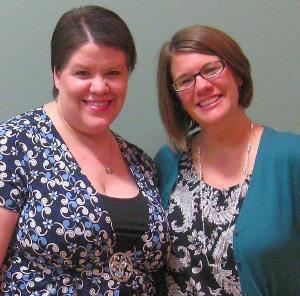
Next Stop: On Tuesday at 7 p.m., I’ll be speaking on my “Year of Biblical Womanhood” at Asbury United Methodist Church in Prairie Village, Kansas. So if you’re in the area, stop by and we’ll hang out. Let me know if you plan to be there!
Around the Blogosphere…
Best Reaction:
Malala Yousafzai leaves Jon Stewart speechless
Best Headline:
“America Likes Nickelback More than Congress”
Best Idea:
Rachelle Mee-Chapman with “Tithe Your Power”
“Listen Friends, what I want to tell you is this. The world needs you to start leading again. To step out of the shadows and into your strength, your skills, your compassionate heart, your crazy ideas. But you don’t have to be THE ONE in charge. And you don’t have to go it alone. Let’s share our strength. Let’s make room on the stage for the voices that have a whisper in a crowd. (They want to roar, and we need to hear them.) Let us – well and truly – LEAD.”
Best Point:
Nour Armagan with “On The Never-Ending Need of Western Churches to Warn the Non-Western Church”
“Works of African, Asian, Latin American and Middle Eastern theologians are designated as ‘contextual’ whereas works of British or American theologians are marked as ‘theology’, as if they were not also products of their context, as if they do theology outside of parameters of a language, culture and preferred methodologies of interpretation and application. This grants Western theology a supra-contextual status and relegates non-Western theology to an inferior, semi-theology status. Obviously, such a classification is not empirical, but merely a sad reflection of how Western Christians see themselves in relation to the rest of the world.”
Best Conversation-Starter:
Kate Wallace at the Junia Project with “Why I am a Feminist and an Egalitarian (And Why They Are Not the Same)"
“We need feminism outside the Church to fight for women’s rights. We need egalitarianism inside the Church to advocate for mutual servanthood.”
Best L
ist:
RNS with “Best Tweets From #AddaWordRuinaChristianBook trend
Best Storytelling:
Matthew Moore at The Atlantic with “Growing Up with An Autistic Brother in the 1990s”
“Outside of our immediate family, relatives had a hard time accepting that they could not treat Michael the same way they treated me. Countless Christmas and Thanksgiving dinners were spent with someone trying to tell Michael what to do, which often led to passive aggressive arguments about the best way to raise an autistic child.”
Best Reminder:
Carleen Lane with “You Are Enough”
“You don’t have to be at All The Things for church. It’s ok to say no to things, even good things. It’s ok to skip just because you needed some time spent alone, or with a friend. God isn’t shaking His fist at you. You, in all your weariness and introverted-ness, are enough."Best Series:
Richard Beck blogging through “Christ and The Powers” by Hendrik Berkhof and Scot McKnight blogging through N.T. Wright’s latest
Best Analysis:
Margaret Mowczko with "Busy at Home"
Best Campaign (Like, Ever):
Sarah Bessey’s “I am a Jesus Feminist…” campaign
(Some of the reader-submitted photos will bring you to tears! Be sure to add yours!)
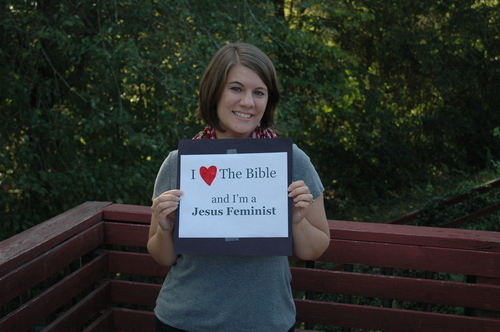
Most Creative:
“15th-Century Flemish-Style Portraits Recreated in Airplane Lavatory” and “Dad Takes Crazy Photos of Daughters”
Most Hilariously Informative (nominated by Kristina Amundsen)
The Oatmeal on Columbus Day
Most Eye-Opening:
Project Unbreakable
Most Relatable:
Jamie Wright with “Better when”
“When is a dangerous place to hang your Hope.”
Most Sobering:
Pete Enns with “If They Only Knew What I Thought: The Sad Cycle of Evangelical Biblical Scholarship”
“Folks, we have a real problem on our hands, and everyone has to bear some responsibility. Here’s the familiar scenario. The “best and brightest” students in Evangelical seminaries work hard and are encouraged and aided by their professors to pursue doctoral work. Many wind up going to some of the best research universities in the world. This is a feather in everyone’s cap, and often they are hired back by their Evangelical school or elsewhere in the Evangelical system. Sooner or later, these professors find out that their degree may be valued but their education is not.”
Most Moving:
“When We Came Out”: A Collaborative Post at Redemption Pictures
“Had it not been for that little hastily scribbled note, I may not have remained in the church, much less become an ordained minister – but Love made a place for me – as Love always does.”
Most Enlightening:
Christena Cleveland with “So you wanna be a diverse church? Here’s how”
Most Insightful:
Rachel Stone at Relevant with “Just Because It’s New Doesn’t Mean You Should Care”
“We need old books not because they are necessarily better or somehow infallible (“People were no cleverer then than they are now; they made as many mistakes as we,” Lewis writes, “but not the same mistakes”) but because to read only new books is to join “at 11 o'clock a conversation that began at eight,” and thus to be unable to understand fully all that is going on.”
Most Empowering:
The Girl Declaration
Most Beautiful:
John Blase at Deeper Story with "Vigilante"
Wisest:
Abi Anne with “Plans”
“God’s Will was like a tricky Choose Your Own Adventure book in which every storyline but one ends with you being eaten by alligators or run over by a lawn tractor, and if you turn to page 46 instead of page 23 you’re doomed to a lifetime outside of God’s favor.”
Bravest:
Benjamin Moberg (Registered Runaway) with “These Hallowed Grounds: Our Story”
“As unbelievable as it sounds, I think I first knew I was gay the morning my pastor said it was evil.”
[Benjamin had been blogging anonymously, but came out online this week.]
Funniest (nominated by Carrie Nettles):
Stacy Sergent with “Who Wants to Date a Reverend?”
“Waiting until the first date (or at least the first phone call) to lay this on him gives him a better chance of seeing me as a whole person. The results have been mixed. Sharing with one guy about my sense of calling nearly made him choke on his beer. “What’s that like?” he laughed. “God just showed up and said, ‘Hey, Stacy, get off your ass and work for me’?” We didn’t have a second date. Another man was okay with my being a chaplain, but was horrified to learn that I’d done mission work. From the look on his face, you would’ve thought I’d told him I strangled puppies for fun. One guy said he was very impressed by what I wrote in my profile about my theological beliefs, which were quite different from his own. So I went ahead and laid out for him what I do and how being a chaplain has affected my understanding of God. His response was simply, “Wow. That is pretty damned cool.” (“He’s a keeper,” I thought.)”
Cleverest:
Third Way with “New Mennonite Programming”
“Breaking Bread – a Mennonite pastor finds out he has terminal cancer and starts selling unpasteurized milk on the side to raise extra money. Does his new secret life harbour hidden dangers like the bacteria in the milk he sells or is he simply freeing himself from needless religious and governmental restrictions?”
Truest:
Mark Deymaz with “It’s Not Resurgence We Need But Reformation”
“I'm not arguing against those who would extend the love of God (the Gospel) to people with a similar background. Rather, I am suggesting that nowhere in the New Testament will you find the apostle Paul or anyone else encouraging you to plant, grow or develop a church that is focused on a single people group.”
Most Honest (nominated by Kristin Lee Williams)
Esther Emery with “Some Words About Jealousy and Christian Feminism”
“Then I had to ask myself some hard questions. About joining. And supporting. And there, in the darkness of my chest, I ran into a feeling I don’t much care for…which is jealousy.”
Most Beautifully Vulnerable (nominated by Tanya Marlow)
Leigh Kramer with “If, Not When”
“People tell me to be glad I don't have the baggage that comes with break ups and broken hearts but we all have baggage. We've all made mistakes. There's real pain in the baggage of never being picked. From not being pursued. From not being asked on a second or third date. From never hearing, "I love you" from the one you love."
Most Needed:
John Blake at CNN with “Holy Trollers: How to Argue About Religion Online”
“Gordon Newby, a professor of Middle Eastern and South Asian Studies at Emory University, said most people change religious beliefs “not because of one argument” but only after long conversations and intimate exposure to another faith. ‘Logical arguments are nice but they're not going to change someone’s life,’ Newby said. ‘We’re way too complicated for that. We’re not programmed machines. We have this whole limbic system of emotions and appetites and everything else.’”
Most Provocative:
Jody at Between Worlds with “When White People Don’t Know They’re Being White”
Most Relevant to Recent Conversations (nominated by Micah J. Murray)
Nate Pyle with “Stop Using the Bible”
“The room was really silent as the elder’s words rang through the room. I quietly leaned forward and, in as non-anxious a voice as I could muster said, “I love the Bible. But people don’t need the Bible. They need Jesus.”
Most Likely To Make You Cheer (nominated by Sarah Ellerbusch Monson)
Brian Wiele with “Women Are Called”
“God chose and called gifted women to leadership positions; the Bible is full of examples of this truth. This is foundational, and not open to our exegetical interpretations or “holy tradition” to understand it differently. And nothing has changed; God still chooses and calls women to this day. The King of kings and Lord of lords decided that his household— a strongly biblical term for the church—will have a distinctive motif of men and women prophesying and serving and making decisions together. Display this theme prominently, he says to the men of the church; don’t put women on the lower shelf of leadership or assign them to the children’s wing or the kitchen. It may not be your personal preference to have them lead with you. It will run counter to patriarchal cultures, where the guy gets to rule the roost. It may not be easy. But you need to get used to it.”On Twitter…
No one's doubt has ever pushed me away from the Church; their arrogance often has.
— Tamára Lunardo (@tamaraoutloud) October 9, 2013
The great drama will end, not with 'saved souls' being snatched up into heaven, but with the New Jerusalem coming down from heaven to earth.
— N. T. Wright (@NTWrightSays) October 9, 2013
The Lion, the Witch, and the Wardrobe Malfunction #AddaWordRuinaChristianBook
— J.A. Medders (@mrmedders) October 7, 2013
Chicken Soup Nazi for the Soul #AddaWordRuinaChristianBook
— Cameron Strang (@cameronstrang) October 8, 2013
On the Blog….
Most Popular Post:
A Year of Biblical Womanhood Genre Cheat Sheet
Most Popular Comment:
In response to the Year of Biblical Womanhood Genre Cheat Sheet, Ben Emerson wrote:
“Well now, here's your problem: you wrote a book with too many genre changes. How can you expect us to know which is which? Now if you will excuse me, I am going back to some simple reading we all can understand: the Bible.”
So, what caught your eye online this week? What’s happening on your blog?



October 12, 2013
"A Year of Biblical Womanhood" Genre Cheat Sheet
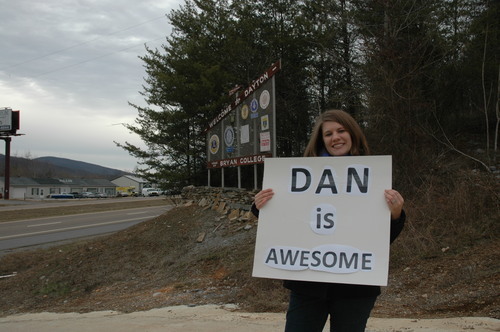
Quick links: download in color (pdf) download in black and white (pdf)
Although A Year of Biblical Womanhood released more than a year ago, a few new reviews have surfaced in recent days from folks who are concerned that “women might be confused” by the fact that my yearlong exploration of biblical womanhood involved following all of the Bible’s instructions for women as literally as possible, sometimes taking them to their most literal extreme.
Holding a homemade “Dan is Awesome” sign outside the Welcome to Dayton sign in order to literally praise my husband at the city gate (Proverbs 31:32) “disregards basic principles of interpretation,” they say, and is not how most Christians interpret or apply that passage.
No kidding. That was kind of the point.
They are also concerned that I presented and explored a variety of divergent perspectives on what “biblical womanhood” means (from Jewish, Catholic, Amish, feminist, polygamist, Christian fundamentalist and complementarian viewpoints, to name a few), including some viewpoints with which they do not agree.
Again, that was kind of the point—to show that “biblical womanhood” is not as straightforward as some would make it seem.
This gentlemen sums up my frustration well:
Amazing for anyone to accuse an experiment examining rival biblicisms of a failure to recognize hermeneutical complexity @rachelheldevans
— Chris Dowdy (@jehiahdowdy) October 11, 2013
As does this smart lady:
As you know, @ostrachan, the key to a good hermeneutic is establishing genre. @rachelheldevans wasn't exegeting for a theology class.
— Rachel Marie Stone (@Rachel_M_Stone) October 11, 2013
I’ve responded to these sort of critiques before, and will post an article next week addressing the charge that I misrepresented complementarianism, even though I never even use the word in the book (except one time when I was quoting someone else).
But in the meantime, Dan put his own frustration to work and created this handy “Year of Biblical Womanhood Genre Cheat Sheet” for those who may be confused by literary genres and do not know the difference between, say, satire and biblical exegesis.
A Year of Biblical Womanhood Genre Cheat Sheet (PDF)
download in color (pdf)
download in black and white (pdf)
Praising my husband at the city gate with a sign, for example, is hyperbolic satire. Doing a New Testament word study on the Greek word “praus” in order to better understand what Peter means when he instructs women to have a “gentle and quiet spirit” in 1 Peter 3:3-4 is biblical exegesis. Interviews and quotes fall under the nonfiction category, and working my way through Martha Stewart’s Cooking School clearly belongs in the apocalyptic genre. Wearing a head covering…well, that depends on who you ask.
I had perhaps naively assumed that this would all be rather obvious from the outset. (The Amazon reviews and the response of audiences when I give presentations suggest most readers have not needed clarification; they seem to know when to laugh.) But arguments over whether I really needed to camp out in a tent during my period sure have provided a convenient way to avoid engaging the substance of the book, most of which subjects common assumptions regarding “biblical womanhood” to an examination alongside the actual biblical texts and explores how hermeneutical biases are at work in our interpretation of this concept.
Unfortunately, it seems the best way to avoid engaging what an author actually says is to passionately disagree with what she didn’t.
Special thanks to Dan who both conceived of and executed the Year of Biblical Womanhood Genre Cheat Sheet. (I don’t know if you’ve heard, but he’s pretty awesome.)
See also: Biblical Womanhood and the Illusion of Clarity: A Response to Kathy Keller
And A Year of Biblical Womanhood is just $2.99 on Kindle/Nook this week.



Rachel Held Evans's Blog
- Rachel Held Evans's profile
- 1710 followers



